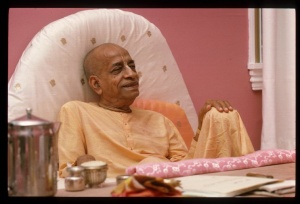SB 7.5.1: Difference between revisions
m (1 revision(s)) |
(Vanibot #0054 edit - transform synonyms into clickable links, which search similar occurrences) |
||
| (One intermediate revision by one other user not shown) | |||
| Line 1: | Line 1: | ||
{{info | {{info | ||
|speaker= | |speaker=Nārada Muni | ||
|listener= | |listener=King Yudhiṣṭhira | ||
}} | }} | ||
[[Category:Srimad-Bhagavatam - Canto 07 Chapter 05|s01 ]] | |||
[[Category:Bhagavatam Verses Spoken by Narada Muni - Vanisource|070501]] | |||
<div style="float:left">'''[[Srimad-Bhagavatam]] - [[SB 7|Seventh Canto]] - [[SB 7.5: Prahlada Maharaja, the Saintly Son of Hiranyakasipu|Chapter 5: Prahlāda Mahārāja, the Saintly Son of Hiraṇyakaśipu]]'''</div> | |||
<div style="float:right">[[File:Go-previous.png|link=SB 7.5 Summary]] '''[[SB 7.5 Summary]] - [[SB 7.5.2]]''' [[File:Go-next.png|link=SB 7.5.2]]</div> | |||
{{RandomImage}} | |||
==== TEXT 1 ==== | ==== TEXT 1 ==== | ||
<div | <div class="verse"> | ||
śrī-nārada uvāca | :śrī-nārada uvāca | ||
paurohityāya bhagavān | :paurohityāya bhagavān | ||
vṛtaḥ kāvyaḥ kilāsuraiḥ | :vṛtaḥ kāvyaḥ kilāsuraiḥ | ||
ṣaṇḍāmarkau sutau tasya | :ṣaṇḍāmarkau sutau tasya | ||
daitya-rāja-gṛhāntike | :daitya-rāja-gṛhāntike | ||
</div> | </div> | ||
| Line 18: | Line 23: | ||
==== SYNONYMS ==== | ==== SYNONYMS ==== | ||
<div | <div class="synonyms"> | ||
śrī-nāradaḥ | ''[//vanipedia.org/wiki/Special:VaniSearch?s=śrī&tab=syno_o&ds=1 śrī]-[//vanipedia.org/wiki/Special:VaniSearch?s=nāradaḥ&tab=syno_o&ds=1 nāradaḥ] [//vanipedia.org/wiki/Special:VaniSearch?s=uvāca&tab=syno_o&ds=1 uvāca]'' — the great saint Nārada said; ''[//vanipedia.org/wiki/Special:VaniSearch?s=paurohityāya&tab=syno_o&ds=1 paurohityāya]'' — to work as priest; ''[//vanipedia.org/wiki/Special:VaniSearch?s=bhagavān&tab=syno_o&ds=1 bhagavān]'' — the most powerful; ''[//vanipedia.org/wiki/Special:VaniSearch?s=vṛtaḥ&tab=syno_o&ds=1 vṛtaḥ]'' — chosen; ''[//vanipedia.org/wiki/Special:VaniSearch?s=kāvyaḥ&tab=syno_o&ds=1 kāvyaḥ]'' — Śukrācārya; ''[//vanipedia.org/wiki/Special:VaniSearch?s=kila&tab=syno_o&ds=1 kila]'' — indeed; ''[//vanipedia.org/wiki/Special:VaniSearch?s=asuraiḥ&tab=syno_o&ds=1 asuraiḥ]'' — by the demons; ''[//vanipedia.org/wiki/Special:VaniSearch?s=ṣaṇḍa&tab=syno_o&ds=1 ṣaṇḍa]-[//vanipedia.org/wiki/Special:VaniSearch?s=amarkau&tab=syno_o&ds=1 amarkau]'' — Ṣaṇḍa and Amarka; ''[//vanipedia.org/wiki/Special:VaniSearch?s=sutau&tab=syno_o&ds=1 sutau]'' — sons; ''[//vanipedia.org/wiki/Special:VaniSearch?s=tasya&tab=syno_o&ds=1 tasya]'' — of him; ''[//vanipedia.org/wiki/Special:VaniSearch?s=daitya&tab=syno_o&ds=1 daitya]-[//vanipedia.org/wiki/Special:VaniSearch?s=rāja&tab=syno_o&ds=1 rāja]'' — of the King of the demons, Hiraṇyakaśipu; ''[//vanipedia.org/wiki/Special:VaniSearch?s=gṛha&tab=syno_o&ds=1 gṛha]-[//vanipedia.org/wiki/Special:VaniSearch?s=antike&tab=syno_o&ds=1 antike]'' — near the residence. | ||
</div> | </div> | ||
| Line 25: | Line 30: | ||
==== TRANSLATION ==== | ==== TRANSLATION ==== | ||
<div | <div class="translation"> | ||
The great saint Nārada Muni said: The demons, headed by Hiraṇyakaśipu, accepted Śukrācārya as their priest for ritualistic ceremonies. Śukrācārya's two sons, Ṣaṇḍa and Amarka, lived near Hiraṇyakaśipu's palace. | The great saint Nārada Muni said: The demons, headed by Hiraṇyakaśipu, accepted Śukrācārya as their priest for ritualistic ceremonies. Śukrācārya's two sons, Ṣaṇḍa and Amarka, lived near Hiraṇyakaśipu's palace. | ||
</div> | </div> | ||
| Line 32: | Line 37: | ||
==== PURPORT ==== | ==== PURPORT ==== | ||
<div | <div class="purport"> | ||
The beginning of the life story of Prahlāda is recounted as follows. Śukrācārya became the priest of the atheists, especially Hiraṇyakaśipu, and thus his two sons, Ṣaṇḍa and Amarka, resided near Hiraṇyakaśipu's residence. Śukrācārya should not have become the priest of Hiraṇyakaśipu because Hiraṇyakaśipu and his followers were all atheists. A brāhmaṇa should become the priest of a person interested in the advancement of spiritual culture. The very name Śukrācārya, however, indicates a person interested in obtaining benefits for his sons and descendants, regardless of how the money comes. A real brāhmaṇa would not become a priest for atheistic men. | The beginning of the life story of Prahlāda is recounted as follows. Śukrācārya became the priest of the atheists, especially Hiraṇyakaśipu, and thus his two sons, Ṣaṇḍa and Amarka, resided near Hiraṇyakaśipu's residence. Śukrācārya should not have become the priest of Hiraṇyakaśipu because Hiraṇyakaśipu and his followers were all atheists. A ''brāhmaṇa'' should become the priest of a person interested in the advancement of spiritual culture. The very name Śukrācārya, however, indicates a person interested in obtaining benefits for his sons and descendants, regardless of how the money comes. A real ''brāhmaṇa'' would not become a priest for atheistic men. | ||
</div> | </div> | ||
__NOTOC__ | |||
<div style="float:right; clear:both;">[[File:Go-previous.png|link=SB 7.5 Summary]] '''[[SB 7.5 Summary]] - [[SB 7.5.2]]''' [[File:Go-next.png|link=SB 7.5.2]]</div> | |||
__NOTOC__ | |||
__NOEDITSECTION__ | |||
Latest revision as of 23:02, 18 February 2024

A.C. Bhaktivedanta Swami Prabhupada
TEXT 1
- śrī-nārada uvāca
- paurohityāya bhagavān
- vṛtaḥ kāvyaḥ kilāsuraiḥ
- ṣaṇḍāmarkau sutau tasya
- daitya-rāja-gṛhāntike
SYNONYMS
śrī-nāradaḥ uvāca — the great saint Nārada said; paurohityāya — to work as priest; bhagavān — the most powerful; vṛtaḥ — chosen; kāvyaḥ — Śukrācārya; kila — indeed; asuraiḥ — by the demons; ṣaṇḍa-amarkau — Ṣaṇḍa and Amarka; sutau — sons; tasya — of him; daitya-rāja — of the King of the demons, Hiraṇyakaśipu; gṛha-antike — near the residence.
TRANSLATION
The great saint Nārada Muni said: The demons, headed by Hiraṇyakaśipu, accepted Śukrācārya as their priest for ritualistic ceremonies. Śukrācārya's two sons, Ṣaṇḍa and Amarka, lived near Hiraṇyakaśipu's palace.
PURPORT
The beginning of the life story of Prahlāda is recounted as follows. Śukrācārya became the priest of the atheists, especially Hiraṇyakaśipu, and thus his two sons, Ṣaṇḍa and Amarka, resided near Hiraṇyakaśipu's residence. Śukrācārya should not have become the priest of Hiraṇyakaśipu because Hiraṇyakaśipu and his followers were all atheists. A brāhmaṇa should become the priest of a person interested in the advancement of spiritual culture. The very name Śukrācārya, however, indicates a person interested in obtaining benefits for his sons and descendants, regardless of how the money comes. A real brāhmaṇa would not become a priest for atheistic men.